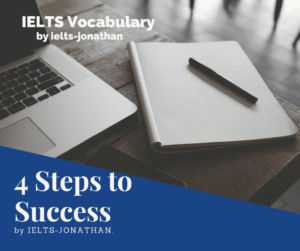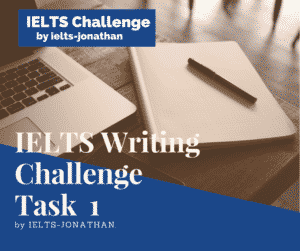4 Steps to Success in IELTS
-
It’s important to improve your vocabulary for each IELTS topic.
Improving your vocabulary for each topic will help you in three ways.
- Having the relevant vocabulary will help you generate your ideas and so help with Task Achievement.
- This will also make your ideas clearer (coherence)
- and demonstrate to the examiner a high level of vocabulary, this is your lexical resource.
Student mistakes
Many students fail to provide sufficient or appropriately used vocabulary and their band score is reflected in this.
When looking at a topic, it is important to record new vocabulary correctly so you build up a bank of words internally.
When you see new vocabulary in a reader, article or passage
- try and predict the meaning from the context
- then look at the sentence to see how the word is connected to other words.
- before you check the meaning in a dictionary and
- finally, record the word in some way for future reference.
I personally use a notebook, but some apps allow you to make electronic notepads, and you might already have an established method.
What’s important is that you note the word and THEN review it and regularly!
To be able to use a word effectively, it needs to be reviewed at least three times before it can be practiced.
Don’t just make a list and abandon it.
-
Focus on a topic
Like any good textbook or school syllabus, vocabulary is presented within a theme so it’s important to spend some time focusing on general topics.
Use my list of popular topics and find a reading and a listening activity, for example, a newspaper article and a podcast related to the topic.
Then follow it up with a related TASK 2 writing question or look at some sample materials and note some vocabulary and the MAIN ideas.
If you attend class, discuss with another student or join my Facebook and find a Study Buddy.
The main ideas for IELTS learning here are
Topic awareness, Vocabulary acquisition and Skills Practice
-
Reading and listening widely
If you are fortunate enough to attend class, it is still important to practice at home.
My tactics have always been’ little and often’ as 30 to 60 minutes focused activity per day can make a significant difference to your overall score.
If time is limited, whatever you can do is valuable.
If you study smart this will focus on all four language skills and familiarise you with the common topics at the same time.
It’s a good idea to look at some sample materials from IELTS but it’s a bad idea to rely only on these materials
Actively look for articles on the common IELTS topics and note good vocabulary.
Listening to topics on the radio or podcasts is also a good method and you often find that programmes are grouped by theme.
I regularly post articles relevant to IELTS candidates on my Facebook page and also collect IELTS articles here.
Finally,
-
Expose yourself fully to English
Focussing on topics is a strategy that will best prepare you for IELTS, but it is not enough to consider topics alone.
To be truly effective in IELTS you should gain as much exposure to the language as possible.
Try to read for pleasure and spend time some time listening to the radio or podcasts – you don’t have to understand every word, but the more you actively read and listen, the more you will more easily be able to
- read more quickly, predict content and select the correct answers
- listen efficiently and spell the words that you hear
- write more effectively, and have relevant ideas
- speak more confidently on a range of topics
I’ve collected a bank of reading resources here to get you started.
Again, when you encounter a word you don’t know, note it and check the meaning, collocation and synonyms and review it so they become part of your vocabulary
For Android and Apple here is a list of Note Taking Apps
However, my personal favourite is PENZU. It reminds you to enter notes and also review the notes you have made!
Further Resources
Learning resources related to IELTS
Popular Topics Featured in IELTS
Find further resources to vocabulary below use the search box at the bottom to find answers.
Increase your IELTS TASK 1 Band Score with Adjectives and Adverbs
Comparing and Contrasting Language for IELTS Task 1
Working Correctly with Numbers for IELTS TASK 1
Finally, you can go over to my Facebook page and join other students who are working towards the test.
Join my IELTS WRITING TASK 1 group for free practice.
I hope this article was useful.
Jonathan
I’m Jonathan
I’ve taught IELTS and University English in more than a dozen universities and schools around the world.
I’m a parent, traveller and passionate about language teaching and helping students achieve their dreams.
Whilst living in Austria or working in Asia, I run IELTS courses to help students get to where they want to be.
If you are serious about IELTS, connect with me to see how I can help you.

The Best Approach to Task 2 Writing
Paragraphing in Task 2 Writing
Writing – Benefits of a Foreign University Education








Was this helpful? Leave a comment :)